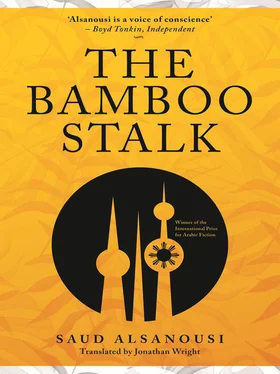I left the laptop on the table and, puzzled, I went to lie down on my bed. Which one of the two was Islam? Was it what I had seen in The Message ? Or was it what had put an end to the life of the director? Was it the Islam of Lapu-Lapu, the sultan of Mactan? Or the Islam of the Abu Sayyaf group in Mindanao? I was filled with confusion, fear and doubt. I wondered whether Satan had taken root in my mind while I was preparing a house for God in my heart.
Sometimes I really wished I could swap brains with my little brother Adrian, so that I could atone for a mistake that I don’t even remember and spare my heart the uncertainty that I had in my mind.
19
Ramadan ended and it was Eid al-Fitr, the feast that follows the month of fasting. I spent the first day behind the curtain in my room, spying on the people visiting the family whose lives I had complicated. No one asked after me. No one sent me any festive greetings apart from Ghassan, who sent me a text message saying Eid Mubarak . The women were in their best clothes and had had their hair done. They came into the house through the inner courtyard. The men wore the usual traditional dress and had shiny new shoes on. Even the little boys, my aunts’ children, were wearing traditional dress with headdresses just like the men. The servants were also celebrating the occasion by wearing new clothes. Through the glass door, which was half open, I could see Grandmother with her legs stretched out as usual. The children were kissing her on the forehead. She stuck her hand in her bag and gave out money to them. Happy, they went out into the inner courtyard and counted the money they had received from the grown-ups. The servants also received their share of presents for Eid and were very happy with them.
I was alone in my room. I imagined myself wearing white and kissing Grandmother on the head to wish her a happy Eid. But then I drove the idea out of my mind, tired of idle fantasies. I turned my back on the curtain and looked around the room for Inang Choleng. I found her withdrawn into her shell under the bed. I lay on my stomach under the bed. I picked her up and stood up with her in my hands. I brought her face close to my forehead so that she could plant a kiss on it. She didn’t do so. I made a kissing sound with my lips to trick myself into thinking that the tortoise had kissed me. I put her on the floor, then went to the small fridge in the corner. I came back with an Eid present for her — a lovely, succulent lettuce leaf. I brought her face close to mine and whispered, ‘Happy Eid.’
* * *
Around noon, after the Eid well-wishers had gone, Khawla knocked on the door of my room, which was half open. She pushed it open and stayed where she was in the doorway, without stepping over the threshold. ‘Happy Eid,’ I said, beating her to it. She wished me well with a friendly smile, but she had nothing in her hand.
‘Aren’t you going to come in and wish Grandmother a happy Eid?’ she asked me. ‘After everyone’s gone? Once she’s sure no one will see the face that brings shame on the family?’ I said. The words just slipped out of my mouth, involuntarily. I was pointing at my own face as I spoke. ‘Khawla!’ I said angrily. ‘Why do they treat me this way?’
She was still smiling, though there was no longer anything to smile about. ‘It’s not easy, Isa,’ she said, looking at the ground.
‘Grandmother and Awatif are religious people,’ I said excitedly. ‘They pray a lot. Is God against me too?’ Khawla didn’t answer. I walked towards the door where she was standing.
‘The Buddha says in his teachings that people are equal and that no one is better than anyone else, other than in their knowledge and their ability to control their desires,’ I said.
‘We’re not Buddhists,’ she said, shaking her head.
I took the chain with the cross from the drawer near my bed. ‘And in the Bible, St Paul the Apostle says there’s no longer any difference between Jews and non-Jews, between slaves and those who are free, between men and women. They are all one in Jesus Christ,’ I told her.
She cast a suspicious look at me. She was about to answer but I didn’t give her time. ‘I know, I know, you’re not Christians.’
I went to my laptop and turned the screen for her to see a website page that I had left open since the night before. ‘The Prophet Muhammad, in his farewell sermon, said, “All mankind is from Adam and Eve. An Arab is not superior to a non-Arab nor is a non-Arab superior to an Arab; also a white person is not superior to a black person nor a black person to a white person, other then in piety and good deeds.”’
I folded the screen down on to the keyboard. ‘I’m not that evil,’ I added.
‘Enough!’ said Khawla, and her raised voice shut me up.
‘I’m sorry,’ she added, and she did look remorseful. ‘But this has nothing to do with religion.’
It’s hard to explain what I gathered from Khawla. Perhaps that’s what Ghassan meant by things that are hard to explain and hard to understand. My existence, Khawla explained, reduced the family’s status in society. Other families of the same class might not agree to marry into our family because of me. They would look at our family with contempt. ‘If you recognised me, would that make you bidoon?’ I asked her in my usual stupidity. My question surprised her.
‘Did Ghassan tell you about the bidoon?’ she asked. ‘Anyway, that’s not what this is about,’ she added before I had time to answer. Khawla explained to me what Ghassan had failed to explain. In Kuwait, I gathered, people didn’t set much store by the word Kuwaiti , even if they were Kuwaiti, because it didn’t mean much. There were different kinds of Kuwaitis, different levels, different classes that distinguished themselves from other classes. I don’t mean to exaggerate. This doesn’t happen only in Kuwait. In the Philippines as well rich families have similar attitudes. I didn’t argue with her on the question of intermarriage, because every family is free to choose, and it was nothing new to me. Filipinos of Chinese origin, for example, don’t intermarry with ordinary people in the Philippines, for reasons of their own. They prefer to marry their own kind. But they don’t put other people in categories in this way, outside their own circles, as either above them or below them. But I saw absolutely no justification for what Khawla said about people despising each other.
Khawla said, ‘In his unfinished novel, my father said we’re Kuwaitis only in times of need. We become Kuwaitis when there’s a crisis, but we soon go back to that horrible putting people in categories as soon as things calm down.’
I really needed to learn Arabic to read what my father had written. ‘What did Father want to say in his novel?’ I asked Khawla.
She pursed her lips, uncertain how to answer. ‘I don’t know, because the novel’s full of contradictions. I dream about rewriting it one of these days,’ she finally said.
I thought of saying, ‘It’s no surprise it’s like that if he was describing his surroundings,’ but I held my tongue.
Khawla elaborated: ‘On the first page he says that one hand can’t clap, but in the body of the story he calls on people to be as one hand. I can’t understand why he calls on people to be as one hand when he’s so sure that one hand couldn’t clap.’
‘One hand can’t clap, but it can slap. Some people don’t need hands clapping for them. They need a good slap to wake them up,’ I said.
‘Isa, I don’t like the way you talk!’
That wasn’t really my style, nor the way I thought, but that was what I concluded my father wanted to say. Khawla said I might be right in what I said and that kind of talk might be acceptable from an insider, but no one would accept me coming from outside and criticising the situation in Kuwait. To change the subject, she asked about people in the Philippines. I told her in turn about the variety there, the mestizo families with Spanish or European roots, the families of Chinese origin, the northern tribes such as the Ifugao, the Aeta and many others. What I said about tribes caught her interest. ‘You have tribes too?’ she asked.
Читать дальше












